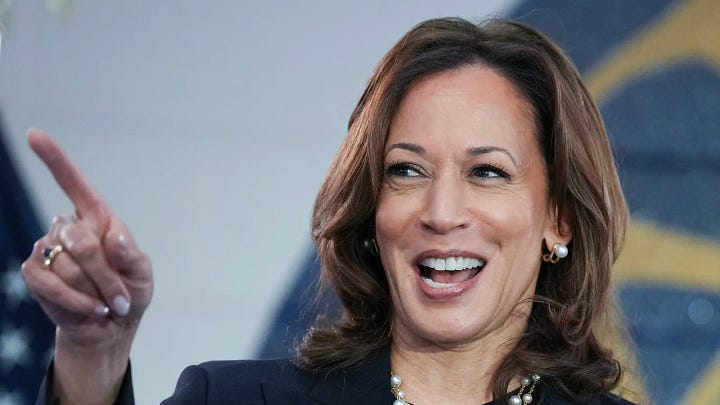Political Reading Recap 8/20/24
Exploring New Approaches in Income Security, Democratic Reforms, Sustainable Technologies, Welfare, Housing Affordability and More!




Hello Political Reading Recap readers,
Here’s a brief look at what’s covered in each section of this week’s newsletter:
Basic Income: We explore a task force’s recommendation for universal basic income in New Mexico, the Denver basic income experiment, LA’s guaranteed income pilot, and more.
Democracy: This section delves into the ongoing influence of unregulated money in U.S. politics, the impact of Project 2025 on campaign finance laws, the experiences of first-time voters, and other significant democratic reforms.
Sustainability: We examine the threats to the Inflation Reduction Act’s clean energy economy, innovations in solar technology, Google’s use of AI to reduce fuel emissions, and more.
Other News: Topics include new actions to lower housing costs from the Biden-Harris administration, the expansion of paid leave, and federal/non-profit efforts to support universal healthcare.
Additionally, we have an interesting question from
The U.S. Electoral College system differs from the “First Past the Post” (FPTP) systems common in former British colonies. In the U.S., the President is elected through the Electoral College, where each state gets electoral votes based on its Congressional representation (Senators + Representatives). There are 538 total electoral votes, and a candidate needs 270 to win. Most states use a winner-takes-all approach, except Maine and Nebraska, which use a proportional method. This system can result in a candidate winning the presidency without the popular vote, as seen in 2000 and 2016.
Each state manages its own election processes, with votes counted and certified by state officials. Transparency is maintained through oversight by independent officials from both major parties, public access to the counting process, and the possibility of recounts.
What I was referencing in my last post regarding Electoral College changes was that the electoral votes assigned to each state had changed due to the congressional reapportionment that occurred in 2020. Electoral votes can change every 10 years based on the U.S. Census, which causes a redistribution of Congressional seats according to population changes. This reapportionment can increase or decrease a state’s electoral votes depending on population shifts.
Readers, I’d love to hear from you too! If you have any news you’d like included or questions of your own that you’d like answered in future newsletters, please comment below or look out for my Twitter posts asking for your input.
Basic Income
Local and State Initiatives
New Orleans’ $50 Weekly Program for Teens: New Orleans expands its program that gives teens $50 a week, showing positive results in financial literacy and school attendance. This initiative highlights the benefits of early financial support.
How LA County’s Guaranteed Income Pilot Has Helped Former Foster Youth: This piece highlights the positive impacts of LA County’s guaranteed income program on former foster youth, providing financial stability and support. It’s an inspiring example of how targeted financial assistance can transform lives.
Denver’s Basic Income Experiment: Denver’s basic income project shows promising results in reducing homelessness and improving mental health among participants. It’s a significant case study on the benefits of direct cash payments.
Birmingham’s Guaranteed Income for Single Mothers: A study shows that Birmingham’s guaranteed income program for single mothers improved parenting and financial stability. It’s an inspiring example of targeted financial support.
Universal Basic Income for At-Risk Families in NM: A task force in New Mexico recommends implementing universal basic income to support at-risk families and reduce child poverty. This proposal could serve as a model for other states.
Perspectives
Guaranteed Income for Young Americans: A proposed tax credit aims to provide $500 monthly to young adults, helping them navigate financial challenges and invest in their futures. This initiative could significantly impact youth poverty.
Guaranteed Basic Income as an Anti-Poverty Strategy: This article discusses why guaranteed basic income is becoming a key strategy to combat poverty, highlighting its positive impacts on health and financial stability.
How to Fix Poverty: Universal Basic Income: This piece explores how universal basic income can address poverty by providing a stable financial foundation for all citizens. It’s a compelling argument for the broader implementation of UBI.
Carbon Tax to Fund Universal Basic Income: This article explores how a carbon tax could fund universal basic income, addressing both poverty and environmental issues simultaneously. It’s a forward-thinking approach to sustainable development.
Democracy
Campaign Finance Reform
50 Years After Watergate: Unregulated Money in Politics: This article examines the ongoing influence of unregulated money in U.S. politics, drawing lessons from the Watergate scandal. It’s a crucial read on campaign finance reforms.
Project 2025 and Campaign Finance Laws: An analysis of how Project 2025, tied to Trump, could weaken campaign finance laws and increase the power of big donors. This piece underscores the need for vigilance in protecting democratic processes.
Voter Engagement
First-Time Voters in the Presidential Election: This article explores the experiences and motivations of first-time voters in the upcoming presidential election. It’s an insightful look at the new generation of voters.
Ranked-Choice Voting and Climate Action: This piece discusses how ranked-choice voting could support climate action by promoting candidates with strong environmental policies. It’s an innovative approach to electoral reform even if it’s not as good as STAR voting or proportional representation.
Election Integrity
Bipartisan Task Force on Election Integrity: A bipartisan task force urges lawyers to defend democracy and election integrity. This article emphasizes the role of legal professionals in safeguarding democratic processes.
Michigan’s Path to Pro-Democracy Reform: Michigan’s recent pro-democracy reforms serve as a model for other states. This piece highlights the importance of state-level initiatives in strengthening democracy.
Sustainability
Clean Energy & Energy Efficiency Innovation
Solar Panels Thinner Than Hair: Innovations in solar technology have led to the development of ultra-thin solar panels, potentially revolutionizing the solar industry. This breakthrough could make solar energy more accessible and efficient.
Nuclear Power for Zero-Emission Maritime: Maersk explores the use of nuclear power for ships, aiming to propel the maritime industry into a zero-emission era. This initiative could significantly reduce the carbon footprint of global shipping.
World’s Biggest Battery in Maine: Form Energy is set to build the world’s largest battery in Maine, a significant step towards long-duration energy storage solutions. This project could revolutionize energy storage and grid reliability.
Google’s AI to Reduce Fuel Emissions: Google uses AI and traffic light optimization to reduce fuel emissions, showcasing the potential of technology in combating climate change. It’s an inspiring example of tech-driven sustainability.
Policy and Organizing Impacts
U.S. Solar Energy Efficiency Tax Credits: Solar energy efficiency tax credits in the U.S. are more popular than expected, driving investment in renewable energy. This article highlights the success of financial incentives in promoting sustainability.
Threats to the Inflation Reduction Act’s Clean Energy Economy: This article examines how Project 2025 threatens the progress made by the Inflation Reduction Act in fostering a thriving clean energy economy. It’s a critical read on policy impacts.
Unionizing Solar Workers: A breakthrough in unionizing solar workers could improve labor conditions and support the growth of the renewable energy sector. This article highlights the intersection of labor rights and sustainability.
Global and National Strategies
Global Roadmap for Clean Energy Access: The UN Secretary-General issues a new global roadmap to secure clean energy access for all by 2030 and achieve net-zero emissions. This ambitious plan is crucial for global sustainability efforts.
America’s First National Strategy to Reduce Plastic Pollution: This article outlines the U.S.'s comprehensive plan to tackle plastic pollution through production, design, and waste management reforms. It’s an essential read for understanding the nation’s approach to mitigating plastic waste.
Other News
Welfare & Paid Leave
Older Adults Missing Out on Benefits: Nine million older adults are not receiving benefits they are eligible for, highlighting gaps in the social safety net. This article discusses the need for better outreach and support.
Harris’ Child Tax Credit Economic Plan: Kamala Harris proposes an economic plan centered on expanding the child tax credit, aiming to reduce child poverty and support working families. This initiative could have significant social and economic impacts.
Moving Past the Mommy Wars: Pro-Family Policy for the Rest of Us: This piece discusses the evolution of family policies beyond the divisive “mommy wars,” advocating for flexible arrangements that support all parents. It’s a thought-provoking read on creating inclusive family policies.
Paid Sick Leave on November’s Ballot: Paid sick leave will be a key issue on November’s ballot in Nebraska, highlighting the importance of worker rights and health policies. This article discusses the potential impacts of this measure.
Healthcare
Universal Health Coverage Knowledge Hub: The World Bank and WHO launch a new knowledge hub to support universal health coverage. This initiative aims to improve global health outcomes and access to care.
Preventing Medicaid Cuts to Hospitals: A bipartisan bill aims to prevent Medicaid cuts to hospitals, ensuring continued access to essential healthcare services. This piece underscores the importance of protecting healthcare funding.
Medicare Drug Price Negotiations: The Biden administration announces historic drug price negotiations for Medicare, expected to save billions for enrollees. This article highlights the potential benefits of this policy change.
Housing
Land Use Regulation and Housing Affordability: This article examines how land use regulations are holding back housing affordability and suggests reforms to address the issue. It’s a critical read on urban development.
Biden-Harris Administration Cuts Red Tape to Lower Housing Costs: This press release, as well as this other one released this week, outlines new measures by the Biden-Harris administration to streamline federal processes and reduce housing costs by building more homes. It’s a crucial read for understanding how policy changes can address housing affordability and boost supply.




